Alpha – PZ.85 : 1872-1925.
The Alpha~PZ.85,was one of the new generation of Mount’s Bay mackerel drivers, introduced in the early 1870’s, after the completion of the railway system from West Cornwall through to Bristol and London. These new boats were generally larger, a little deeper, and swifter than their fore-bearers, with cabin space below decks, aft. They were adopted with a view of more readily meeting the burgeoning demand of the metropolitan centres, for relatively cheap food – in this particular, fresh spring mackerel, which could be on sale in Billingsgate, on the morning after their landing at Newlyn.
The Alpha was a Newlyn boat, having been built in the fishing village, by either Jas. Wills, or William Downing, both celebrated boat-builders in the village, for James and William Hosking, in the winter of 1871-2. The new lugger was named Alpha, when she was registered at the Penzance Custom House, on February 26th, 1872, as a British Sea Fishing Boat. By this registration she was allocated the port fishing number PZ.85, and was simply described as a ‘Lug rigged, Vessel or Boat’ working ‘Drift Nets,’ as her ‘Ordinary mode of Fishing,’ of ’17.24 Tonnage,’ ’44 [ft] Length of Keel,’ ‘6 men, & 1 boy, Crew normally employed.’ with James Hosking being endorsed as her skipper.1
As she measured over 15 tons, by current legislation she also had to be registered and a British Vessel, as well as a Sea Fishing Boat. Registered as such on the same day, she was allocated the British, Official Number 67007; and had a registered length of 44.1 feet; breadth, 13.9 feet; and internal depth of hold of 7.1 feet; which gave her a tonnage measurement of 17.24 tons, capacity.2
Regrettably, the 1872 edition of the Penzance weekly newspaper Cornish Telegraph, is missing from the ‘findmypast.co’ on-line series, so no account of her launch has yet been located, and no newspaper reports of her have been found until the later 1870s. A search being made more time consuming, by the popularity of the word in advertising, and the fact that Messrs Bazeley’s put their local 136 ton schooner Alpha into service on the Penzance – Bristol shuttle service in 1877, lead to a constant succession of weekly reports about her sailing schedule and voyages swamping the field with hits. While a Newlyn based correspondent subbing himself as ‘Alpha,’ muddied the field.
However, there were occasional hits, and we first hear of the Alpha in 1878, along with other luggers of her class, carrying loads of pilchards to Newlyn from the Lizard seans. A common out of season occasional employment for the mackerel drivers.
The boats which received loads from the first tuck from the seans were the Emeu, Excellent, Alpha, Lira, Diana, and Agatha. The first four had from 60 to 70 hogsheads each on board, and the last two about 20 hogsheads each.3
~~~~~
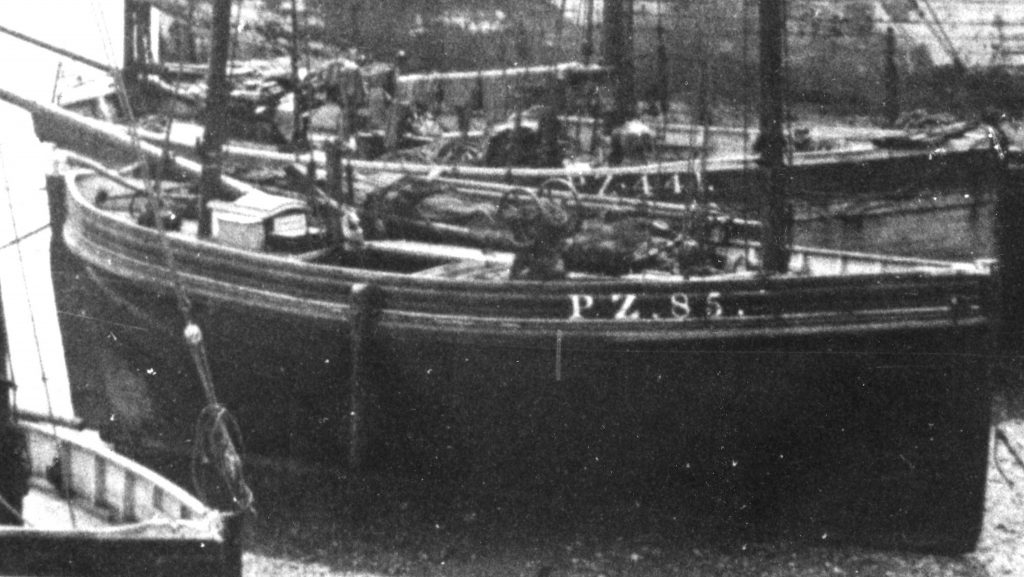
Note the hand-wound fly-wheel capstan for hauling the foot-line of her train of mackerel nets; and the companion-way aft giving access to the crew’s cabin in the stern.
I have always thought that there must have been an error in recording her registered length as a ‘vessel’ as being 44.1 feet, when her registration as a fishing boat records her keel length as being of 44 feet. While she had a very vertical stem, with a sharp fore-foot, she also appears to have had a rake to her stern post, which must have made her over-all registered length more than just one-tenth of a foot longer – probably at least one or two feet longer. However, if this was indeed an error it was never corrected, as her final registration as a fishing boat in 1902 confirmed.4
During her first period of registration under the Hosking’s her certificate of registry was presented at the Custom House annually, as a working fishing boat, from February, 1873 to April, 1881.
At the time the Alpha was built, it must be remembered that there was only the old Medieval Quay at Newlyn, offering very limited shelter for these bigger boats.
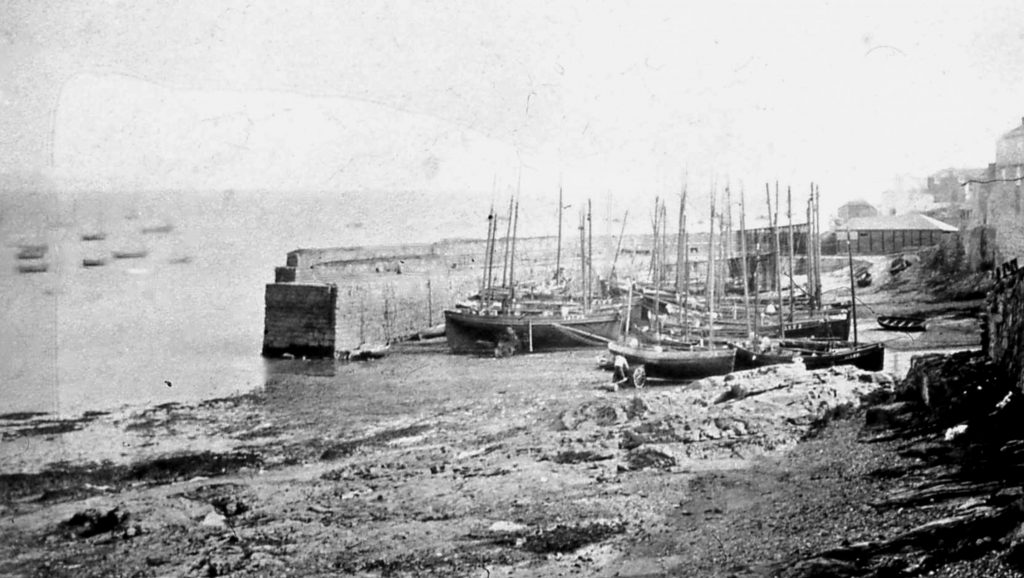
(Photographer Unknown, Author’s collection)
Between voyages, for much of the time during the home fishing seasons, Alpha and her contemporaries lay at open moorings under the Cliff at Newlyn Town, and off Tolcarne. This was a relatively sheltered area of the bay known as Lodgia, or Gwavas Lake, but it was still open water.
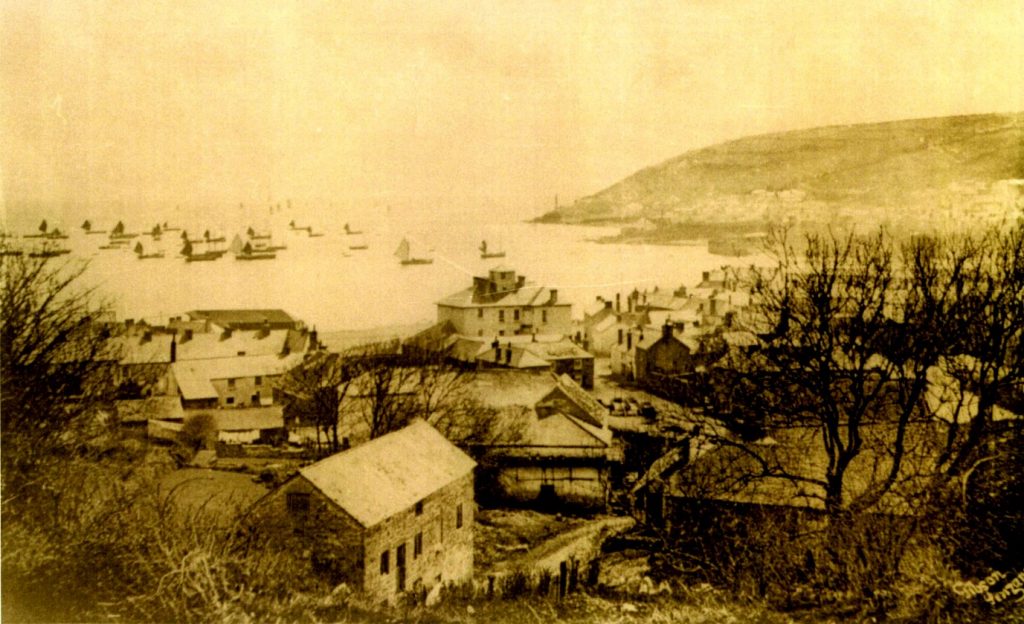
(Gibson sepia print – Author’s collection)
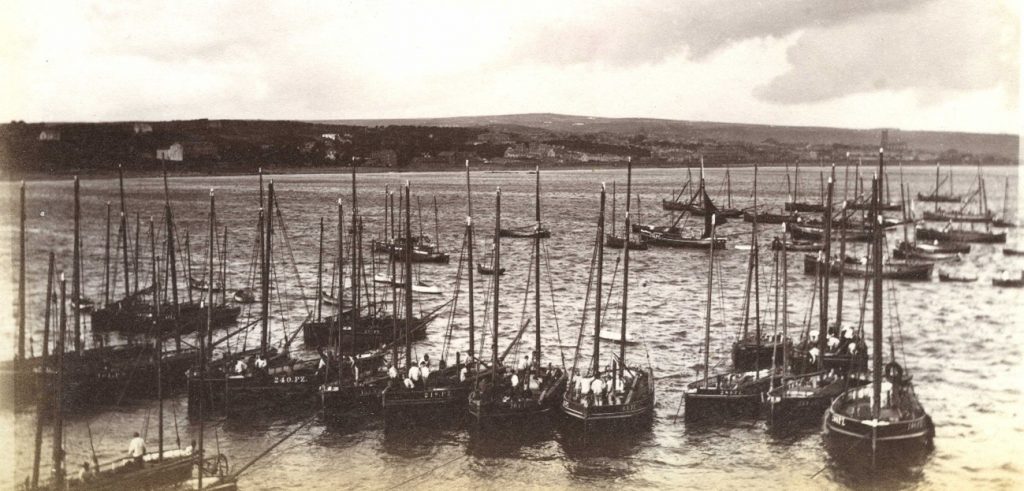
(Unknown photographer – Author’s collection)
Out of season and in the winters, the Newlyn boats had to resort to Penzance harbour for shelter – a very unsatisfactory arrangement, which the Newlyn fishermen had been trying to remedy for many years – but so far without success.
About 1882, the Alpha’s registration was transferred to a new register, for administrative reasons, leaving James and William Hosking as her owners, with James still as skipper, until the opening months of 1891.
Like many of the larger Mount’s Bay luggers, the Alpha frequently engaged in the late summer and autumn North Sea herring fishery, when they generally worked out of Whitby, returning home early in October, before the worst of the winter storms began. Their safe return after six to eight weeks away was anxiously awaited and reported at their home port.
NEWLYN, Oct. 12 – Arrived – Endeavour, Strict; Eliza, Mitchell; Fling, Sullivan; R.G.B., Matthews; Alpha, Hosking; Alexandria, Kelynack; Empress, Williams Dauntless, Wroth, luggers from Whitby.[5]
Unknown source, possibly 1883
Her registration as a British Vessel, was a cost which the fishermen could scarcely afford, and in theory entailed the keeping individual voyage accounts, with crew on half-yearly agreement – as if employed in the Home Trade.’ For fishing boats effectively engaged in the daily fresh fish trade, this was a burdensome process, which was largely ignored by the fishermen – at risk of prosecution. However, common sense eventually prevailed, and compromise rules were adopted releasing fishing boats of over 15 tons from this statutory obligation as their owners’ request. Thus, the Alpha’s registration as a British vessel was duly ‘Cancelled at owners request – Vessel employed in the fishing trade only – Certificate to Reg.r Gen.l 15 July 1890.’
Of course, her registration as a Sea Fishing Boat at Penzance continued in force, and during its period of coverage, on November 14th, 1891, William K. Hosking was endorsed as owner and skipper. This register also carried endorsements of the annual presentation of her fishing certificate at the Penzance Custom House, between January, 1882, and January 1891.
1885, saw an impressive number of Mount’s Bay luggers participating in the North Sea herring season.
THE FISHERY. – From Newlyn the following boats have arrived at Whitby, there to prosecute the herring fishery: – Contest, Alarm, Irene, Hope, Dewdrop, St. Michael, Kingfisher, Fling, swan, Fiona, Richard & James, Jenny Lind, Elizabeth, Pesto, Alpha, Agatha, Joseph, Nyanza, Whisper, B.G.B., Empress, Orlando, and Honour.
Cornish Telegraph¸ Thursday, August 13th, 1885
It was during this period that the Newlyn fishermen finally got their way, with the construction of a new harbour. The work was completed in stages, with the South Pier being completed in 1885-87, enclosing part of Lodgia, and giving much needed shelter from the southward.
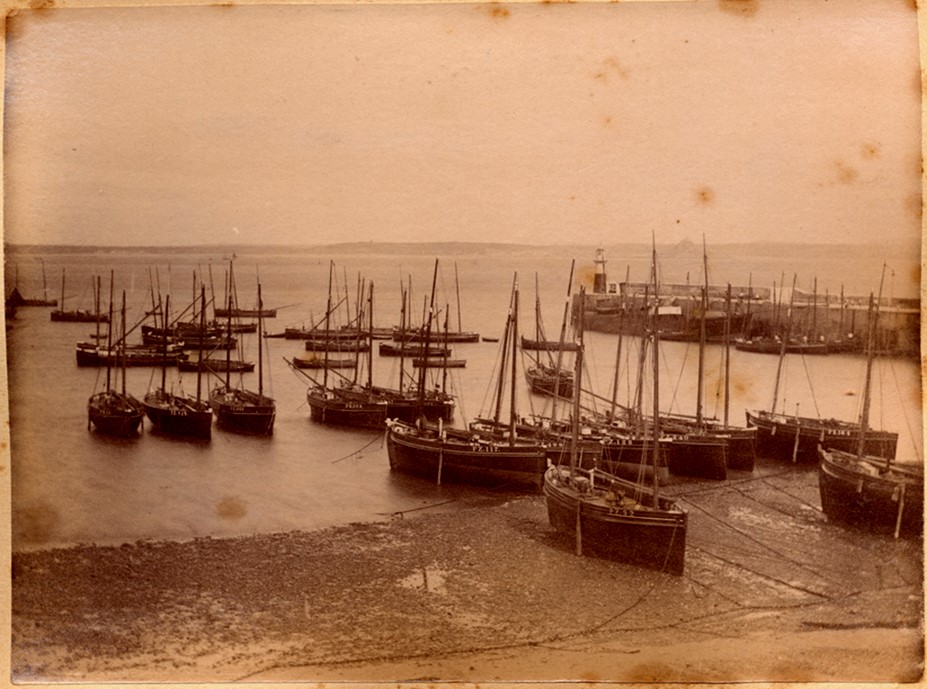
(Penlee House Museum: Eastman Collection)
The construction of the North pier was completed in two stages – as finances permitted – with the first half of that pier being constructed in 1888-89.
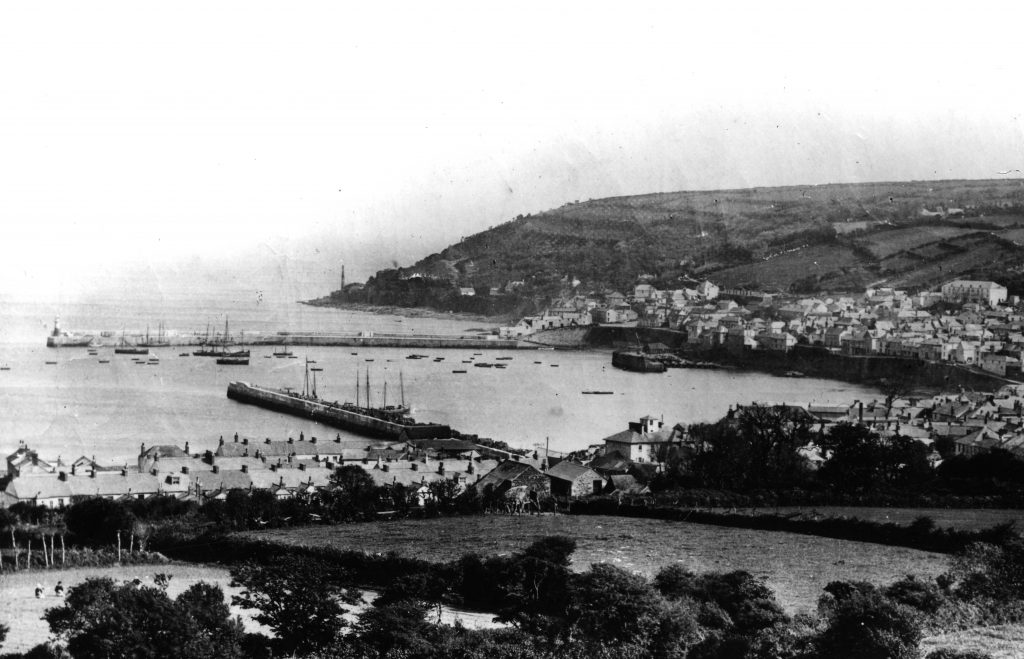
During which period she was again engaged in the North Sea herring fishery in 1889, but got caught in a whirlwind on her homeward passage. –
A PENZANCE VESSEL IN A WHIRLWIND. – The crew of the Penzance fishing smack Alpha which put into Dover on Thursday for repairs, had an exciting experience while proceeding down Channel. They were sailing under full canvas, there being only a moderate breeze, and were near the Kentish Knock Lighthouse, when the water about three hundred yards off was suddenly seen to be agitated in an extraordinary manner. The sea was cut up similar to a waterspout, and then whirled about to a great height. The master of the vessel, Mr. Hosking, who happened to be on the deck, at once recognised the phenomena as produced by a whirlwind, and ran to drop the large sail on the foremast, but before he could get it down the whirlwind travelled across the bows of the vessel, bearing a pillar of water and spray with it. The vessel and crew had a narrow escape. The bow of the vessel was forced under water, while the stern was torn our and carried away, and the sail with it, and the decks were ripped up to a considerable extent. The whirlwind shortly after spent itself.
Cornish Telegraph¸ Thursday, October 3rd, 1889
THE NORTH SEA SEASON. – Fortunate Escape Of One Of The Newlyn Fleet. – With one exception, we believe all Newlyn’s boats have now returned from the North Sea. The Alpha, the boat which sustained such damage in the whirlwind off Dover, has arrived, and it seems marvellous how she escaped from that Channel tornado at all. So great was its violence that ere a sail could be lowered the masts were snapped-off and part of the decks ripped up.
Cornish Telegraph¸ Thursday, October 10th, 1889
She certainly had her share of bad weather. –
A JUNE GALE. – Fearful Cross Sea and Much Damage to Nets. – Wednesday night’s gale is reported by Newlyn’s fishermen to be the severest they have ever experienced at that season of the year. A number of boats rode to their nets, which, when the weather moderated and they were got into the craft, were found to be much damaged. There was a fearful cross sea, and during the height of the storm there was a remarkable escape from drowning by one of the crew of the Alpha. The footline of this boat parted near the tizzy,5 and threw Mr. Charles Chalk overboard. He fell into the water some yards away, but providentially caught the nets, and, after great difficulty, was got on board again.[10]
Cornish Telegraph¸ Thursday, June 9th, 1892
It would appear that William K. Hosking was her owner–skipper at this time, and shortly after this incident the Alpha, was sold.
NEWLYN. – The fishing boat Alpha, of Newlyn, has changed hands and has become the property of Mr. Charles Jenkin.[11]
Cornish Telegraph¸ Thursday, November 3rd, 1892
Charles Jenkin became her registered owner on October 31st, 1892, at which time Joseph Treneer [presumably the younger], was endorsed as her skipper.
The final extension of the North Pier was constructed during 1892-94.
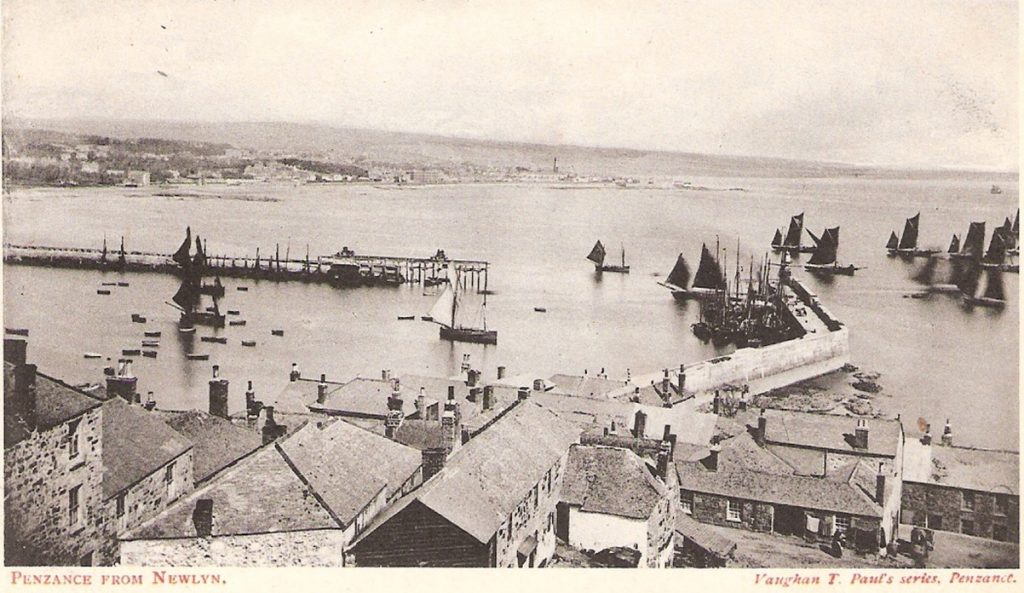
The completion of the new harbour was attended with great celebrations on St. Peter’s Day, 1894.
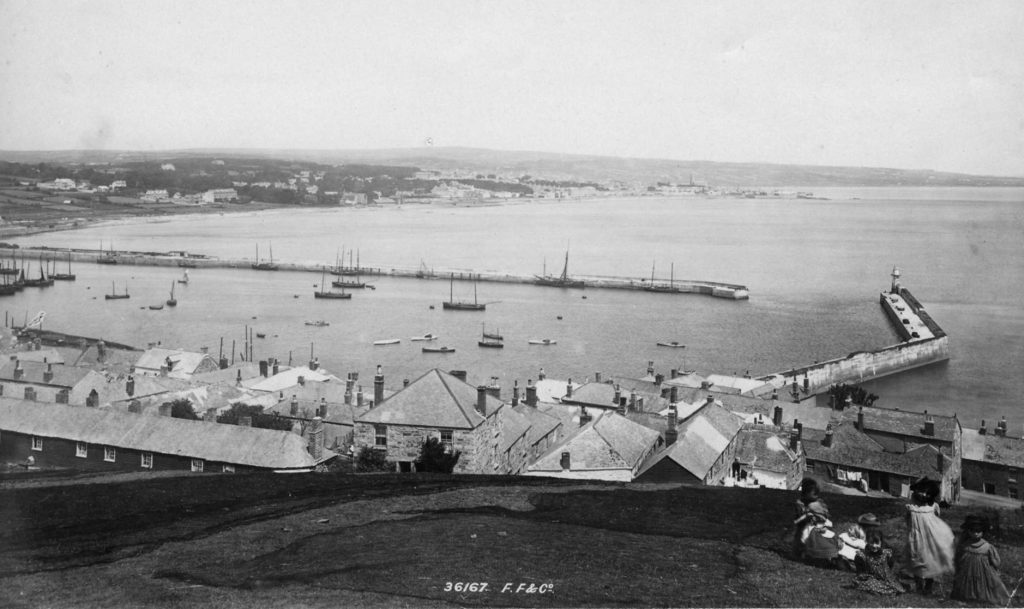
(Frith-Pawlyn collection – 1970)
A Charles Jenkin, fisherman of Newlyn, died on October 9th, 1898, aged 69 [or 59, reports differ].6 Assuming that he was the owner-skipper of the Alpha, the boat seems to have passed to his widow, but this change was never formally registered. (See later remarks about 1899 insurance payments.)
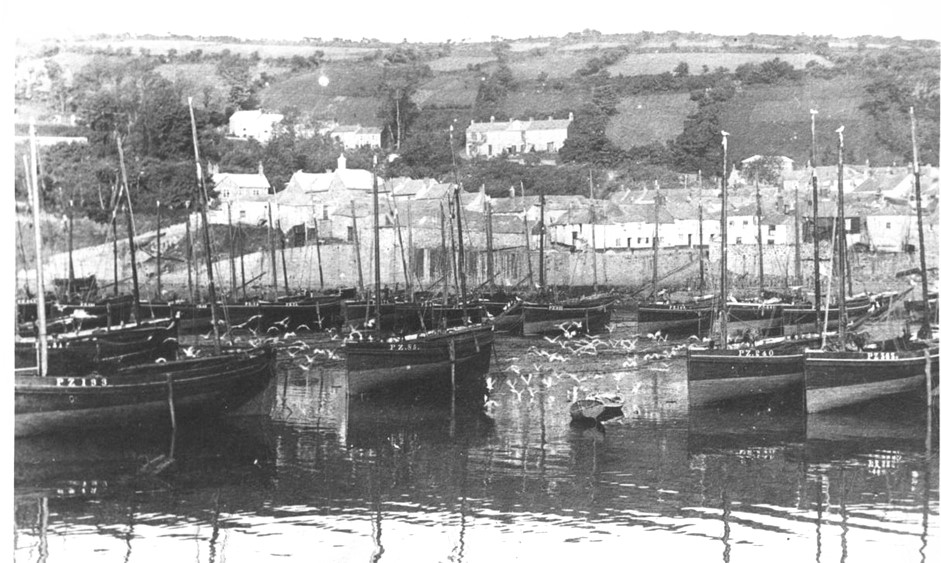
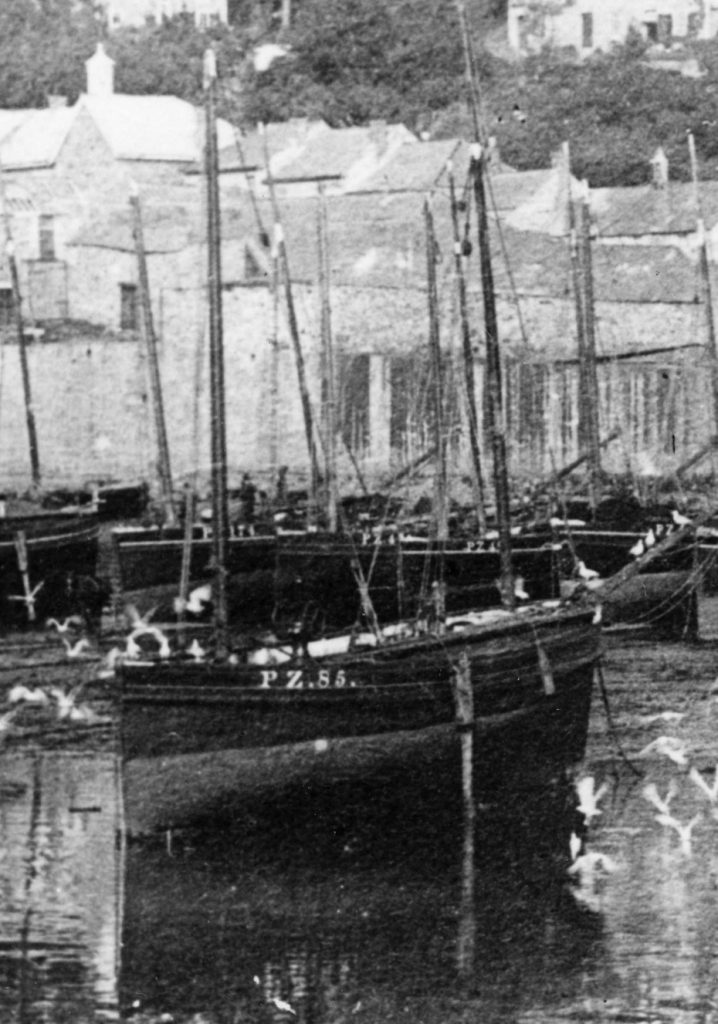
Moored bows to sea-ward, this image of the boats in Newlyn harbour was taken about 1900. Although the harbour had effectively been completed in 1894, there was a tendency for a strong run to build up in the harbour under certain weather conditions. Such conditions prevailed until the South Pier was extended in 1914, which considerably reduced the run. It was during this period that the worst economic disaster struck the little fishing community.
During the spring of 1899, a heavy gale drove across West Cornwall, peaking during the early hours of Friday April 7th, 1899. It occurred at the height of the home mackerel season, and the lugger Alpha was one of the boats most at risk when she and a dozen other Newlyn luggers, were driven out of the harbour. During the course of the night of Thursday, April, 6th, the westerly gale flew into the north, causing a sudden surge amongst the craft moored in the harbour, and parting the chains of two of the central mooring buoys, to which a number of luggers were secured. Buoys and luggers were carried out of the harbour, and dawn that Friday saw many of the prime Mount’s Bay luggers, scattered in distress along the eastern shores of the bay, the boats concerned being. –
| Florence Edith | 557 PZ | T.A. Wallis | Mousehole |
| Come On | 366 PZ | W. T. Maddren | Mousehole |
| Excel | 512 PZ | W. Barnes | Mousehole |
| Valetta | 49 PZ | N.Cornish | Mousehole |
| Alpha | 85 PZ | C. Jenkin | Newlyn |
| Sir Wilfred Lawson | 3 PZ | P.J.Cotton | Newlyn |
| Dart | 41 PZ | W. Bone | Newlyn |
| Progress | 143 PZ | Chappel | Newlyn |
| Onward | 257 PZ | James | Newlyn |
| SIgnet | 161 PZ | R. Harvey | Newlyn |
| Queen of the Bay | 388 PZ | N. Kelynack | Newlyn |
| Dew Drop | 234 PZ | R. Pollard | Newlyn |
| Thistle | 441 PZ | W. Tonkin |
Most were totally wrecked or wrecked beyond repair, and others much damaged. The full account of this economic disaster is too lengthy to cover here, but the account of the Alpha is one that outshone most of the others, in that she was eventually recovered, relatively intact well up the English Channel, after a dramatic episode.
The crews had left their boats, and were sleeping in their homes, as usual when in harbour, and except in the case of the Alpha, where an elderly fisherman named Treneer was sleeping,7 there was no one on the boats. Nothing serious occurred, however, until about four o’clock yesterday morning, when in the height of the gale Coastguard Dean, who was on duty on the pier, noticed that some of the boats were adrift. He immediately informed the harbour master, Mr. Strick, of the fact. An alarm was very quickly raised throughout Newlyn and Mousehole …
The clusters of boats which had been moored to two buoys had by this time drifted past the mouth of the harbour, carrying one or more of the buoys with them, and were driving away at good speed before the gale, and making for the eastern land.8
During the morning news that Treneer and the Alpha, were safe at Praa Sands, turned sour. –
The news that the Alpha is safe at Praa Sands with Trenear on board unfortunately proved to be false. A telegram received from the Lizard said that the fishing boat 85 (the Alpha) has been seen about two miles off drifting to the eastward with one man aboard, and that the Cadgwith lifeboat has put off to her assistance.9
Cornish Telegraph, Thursday, April 13th, 1899
However, the Cadgwith lifeboat’s attempt to rescue the man from the Alpha¸ was given up after they had sailed round her, thinking her to now be a derelict as there was no apparent sign of life on board.
THE ALPHA OFF THE LIZARD.
Splendid Lifeboat Service,
During the height of the gale on Friday morning intelligence was received at the coastguard stations along the coast of South Cornwall through the coast communication telephones that several Penzance boats had broken their moorings … About half-past-nine rocket were heard to the westward of the Lizard, probably from Mullion station, and soon after ten o’clock Coastguard Sullivan, on duty at the Lizard station discovered one of the distressed boats two miles to the westward of the lighthouses, and immediately gave the alarm. The vessel was quickly approaching the Stag Rocks, off the Lizard, and it was very doubtful at the time if she would be able to clear them, as she had no sail on her, and was drifting helplessly, sometimes broadside on to the heavy seas, turning about in all directions, but following the course of the tide. As she got nearer it was plain to see that she had but one man on board, and standing aft, unable to do anything. The Lifeboat rockets were fired from the signal station and telephonic messages were forwarded to Cadgwith lifeboat station.
Dr. Appleton, the hon. secretary of the Lizard lifeboat station, gave orders for the Lizard boat not to put to sea, the Cadgwith boat being not only a much larger and abler boat, but was also in a much better position for cutting off the disabled vessel in the course she was making, being further to leeward. With some difficulty Cadgwith lifeboat put to sea, and stood in under the land almost as far as Hot Point, when she took a southerly course and made directly for the vessel, which by this time had drifted six or seven miles off the land. They had a terrible sea to contend with, but the boat, which is a new one of the largest size, with as fine a crew as could be mustered throughout the kingdom, behaved most nobly. At times she was perfectly hidden in the trough of the sea, again to reappear, the thick blinding spray flying from her the sea boiling around her. She soon reached the distressed vessel, passing her to windward, and then turning came up with her again, and afterwards she took her course towards Black Head. Whether they were successful in rescuing the man was not known at the time of writing, and could not be until the life boat returned to port. The boat is supposed to be P.Z. 85.
A Coverack correspondent telegraphed: – Cadgwith boat came to Coverack at 1.40, after four hours bitter experience. The fishing boat seen off the Lizard proved to be the Alpha, of Penzance, derelict.[16]
Cornish Telegraph, Thursday, April 13th, 1899
They were mistaken, Treneer had just gone below for a rest and a brew! Fortunately for him, it turned out that he had had a providential escape, as events unfolded, and reports came in from further up the Channel. –
WILLIAM TRENEER IN LONDON.
HIS ONE WISH IS TO BE DISPATCHED “Home-Along.”
The Astro-Hungarian steamer Zrinyi arrived at Bellamy’s Wharf, Rotherhithe, on Monday afternoon [10th], (says Tuesday’s Daily Mail having on board the man who was carried off when the Newlyn fishing fleet broke away in the gale.
His name is William Treneer, He had been out 24 hours when the Zrinyi took the boat in tow. The tow line broke four times. The old man’s boat filled up with water, and they had to take him on board the steamer.
“There is nothing the matter with me now,” he said, “but I do want to go home-along. Do try to send me home-along. Do ‘ee, bless ‘ee.”
“I’m a Newlyn man born and bread, and there’s nothing the matter with me. Except I do want to go home along.”
“Where do these people come from? Hungary, is it? They’ve been very kind to me, but they don’t understand me, and I don’t understand they.”
Later in the day William Treneer’s wish was acceded to, and he was dispatched home-along.
Cornishman, Thursday, April 13th, 1899
After several days on board the Zrinyi, with only an unknown foreign tongue spoken, it’s no wonder that William wished to get home to his friends.
The Alpha did not, however, sink. –
The Alpha, from which the old man Treneer was taken, and which was afterwards towed into Brixham, arrived back in Newlyn harbour on Sunday. She had her port rail, stanchions, and bulwarks gone.[18]
Cornishman, Thursday, April 20th, 1899
Meanwhile the other Penzance newspaper gave a full personal report of William Treneer’s experiences.
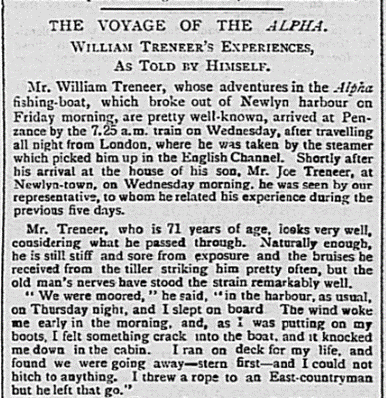
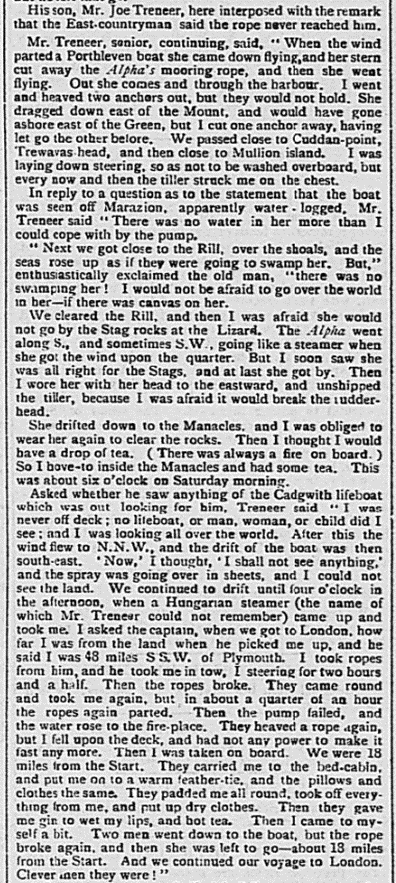
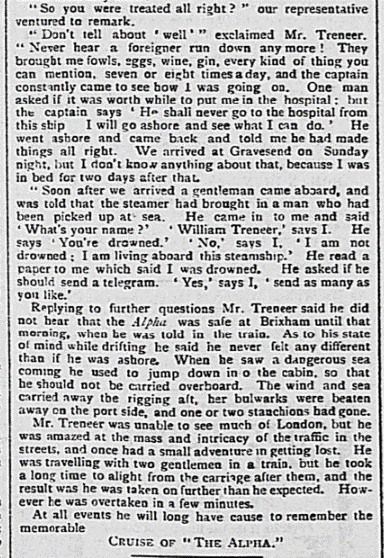
Not only were Mount’s Bay boats damaged in the gale, but some 80 plus East Coast boats were caught at sea that night, suffering heavy loss and damage – particularly to their lengthy trains of nets. None of the losses sustained by the loss of nets was insurable – no club or society being prepared to cover such risky material. In addition, 150 men were thrown out of work, and a fishermen’s deputation calling at the Mansion House, the Lord Mayor of London (Sir John Voce Moore) was persuaded to open a Disaster Fund, with a view to raising £20,000 for the losses sustained by the Lowestoft men, and £4,000 for the Mount’s Bay men. The fund was liberally supported, raising close to the sum required.
Several of the larger Mount’s Bay boats totally lost in the disaster were insured by the Mount’s Bay Mutual Insurance Club, which was virtually wiped-out by the scale of events. However, the Lord Mayor of London’s Disaster Fund, partially made up the deficiency, ensuring the continuation of the club as a going concern.
The Alpha was one of the boats on the books of the Mount’s Bay Mutual Insurance Club, but only in a limited amount. From a sketchy report of their payments. – “Alpha (Mrs. Jenkin and Mr. Trenear), owner’s risk part of salvage, nets £10, 1/3 cost of repairs, say £11, £21.
Her repair remained under consideration for some time, but early in May all was in hand. –
The Alpha has not yet been made ready for sea. Carpenters are busy at work on her and she begins to look shipshape again.
Which effectively closes this particular episode.
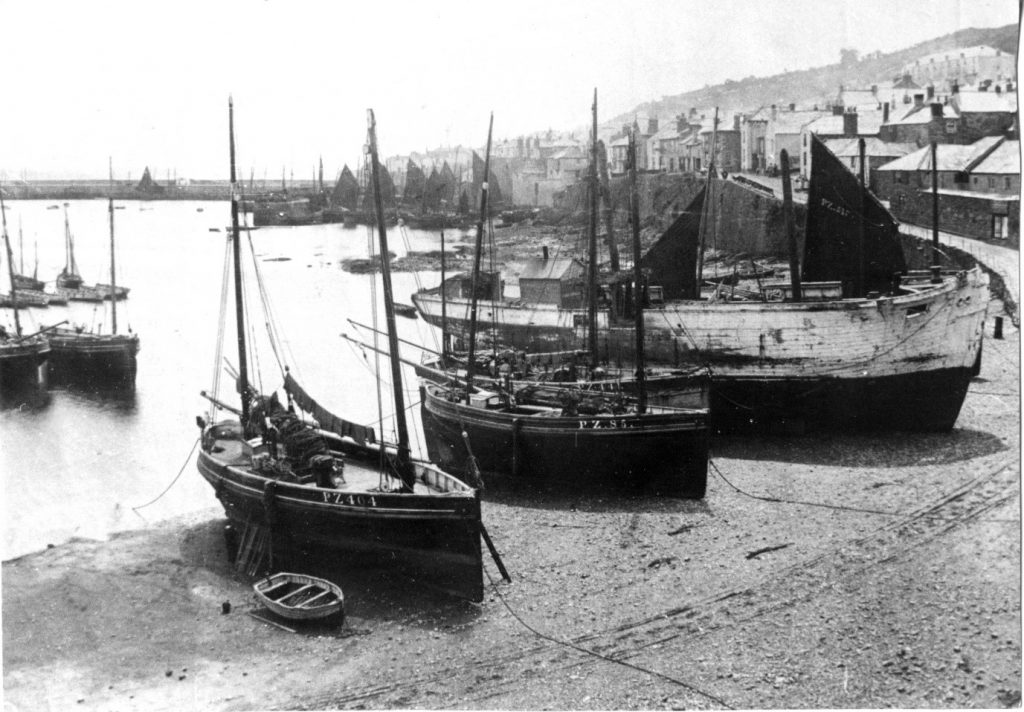
Early in 1902, on January 29th, N. Mathews was endorsed as skipper, in the place of Joseph Treneer.[20]
With the new harbour, and the spring mackerel fishery attracting more and more boats, congestion in the harbour, particularly around the harbour mouth became a seasonal problem.
COLLISION. – It is always difficult for the fishing fleet to sail out of Newlyn harbour with a strong easterly wind blowing in the harbour’s mouth, and in such weather the boats generally get assisted out by friendly hands at the warp from the pier heads. On Thursday the Sweet Home was being warped out by a line from the North pier-head, and had got half way across the harbour entrance, with some little way on her, when round the South pier came the Alpha from sea, with her sails then hauled down. Those on the Sweet Home shouted to the helmsman on the Alpha to take her to the leeward of their craft, but not doing so that the Alpha sailed right across the bows of the Sweet Home, with the result that the latter boat struck the Alpha amidships, giving her a tremendous shaking, as the Sweet Home is the largest and heavier craft. Fortunately, however, no apparent damage was done to either boat, but had the Sweet Home been going with greater speed the consequences would undoubtedly have been serious, and through no fault of those in charge of that craft.[21]
Cornishman, Thursday, June 25th, 1903
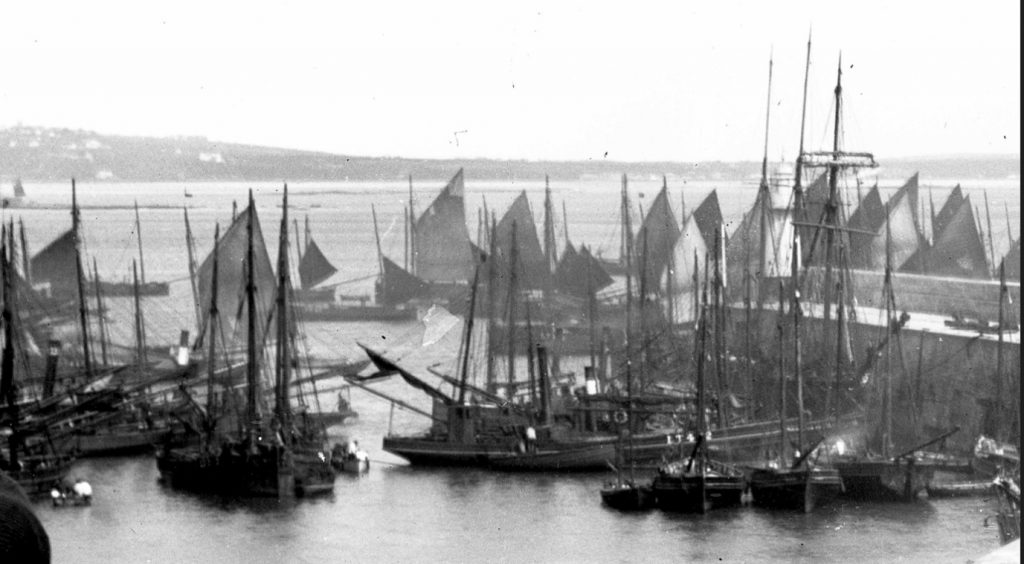
(Pawlyn-Tregonning Collection)
In the spring of 1905, the Alpha was put up for sale.
The lugger Alpha, lying at the foot of the north pier, was put up for auction by Mr. Edgar Morrish on Saturday, but no sale was effected. It was the Alpha it will be remembered that had such a remarkable experience when the 13 boats were blown out of the harbour in the disastrous hurricane of April, 1899, and with the Progress were the only two that survived. The Alpha with Mr. William Trenear on board, was swept across the Bay by the hurricane, round the Lizard into the Channel, and 48 miles S.S.W. of Plymouth. The Austro-Hungarian s.s. Lrinyi fell in with her, and failing to tow the craft, its only occupant, sadly bruised and battered, was taken on board and carried to London from whence he returnee by rail. The Alpha left to her fate was afterwards met with by a French fishing boat who towed her into Brixham leaking badly. She was soon afterwards brought home and again made seaworthy by the Mount’s Bay fishing boat insurance club, and from that time till very recently have been in active service.[22]
Cornishman, Thursday, April 13th, 1905
At some stage the Alpha’s old fly-wheel, hand-wound capstan, had been replaced by a steam one, and this too was now sold-off.
The steam capstan of the lugger Alpha, which is in very good condition, has been acquired by the owner of the lugger Emblem, and the latter craft is now being fitted with the apparatus. For the Alpha, which was put up for auction recently, no purchaser has yet come forward.[23]
Cornishman, Thursday, April 27th, 1905
The increasing pressure on the home mackerel fishery created by the rapid adoption of steam drifters by the Lowestoft and Yarmouth fishermen, was driving many of the sail powered Mount’s Bay luggers out of business. However, the Alpha did find a new owner, at a give-away price.
The lugger Alpha, whose gear, steam capstan, etc., were recently disposed of separately, has been purchased by Mr. C. Leah for £4 10s. The old craft, which is still in a substantial and seaworthy condition, will now be fitted up as a trawler for a further period of good service.[24]
Cornishman, Thursday, May 4th, 1905
Less than a month later, old Mr. Treneer died, aged 77, breaking one more link in the chain of life of the lugger, but there was still a little life left in the aging boat, though the echoes of her past reverberated once more.
Mr. C. Leah, who recently purchased the old lugger Alpha¸ is now having the craft put in thorough repair, and after being painted, payed up, and put in working trim, she will be fitted out for trawling. Synchronising with the renewed lease of life of the lugger, comes the decease of Mr. William Trenear, the old salt whose name will be inseparably linked with that of the Alpha.
There passed away on Wednesday at the Gift House, Paul, at an honoured age, quiet, genial, and much respected, Mr. William Trenear. He was a highly interesting character, and had led a busy life with many exciting experiences, the most remarkable of which he met with in the great gale of April, 1899 … Months elapsed ere Mr. Trenear was able to move about again, and from the ill-usage and terrible experience he underwent for two days in the hurricane he never entirely recovered. After being ill for some weeks, dear old “Uncle Trenear” passed peacefully away on Wednesday of last week, at rest for ever.
Cornishman, Thursday, June22nd, 1905
In the autumn of 1905, pilchards were again enclosed by the Mullion seans, and luggers were employed in carrying the catch up to Newlyn. –
On arrival of the news on Monday, of seams having shot at Mullion and Gunwalloe, several boats left for the former place with a view to obtain loads. The following morning the Eliza and Alpha both returned with loads of pilchards, which were sold by auction, the former boat’s fish being secured by Mr. R. Sullifan at 3s. per basket, while the Alpha’s load went to Messrs. Dunn and Sons at 3s. 3d. per basket.
On Thursday two loaded boats, the Alpha and the Eldorado, came to Mousehole with fish from Mullion – the Alpha, of Newlyn, for Mr. Tregenza; the Eldorado for Mr. J. F. Rowe.
Cornishman, Thursday, September 21st, 1905
A little belatedly, Christopher Leah, of Eden Terrace, was endorsed as owner-skipper, on October 21st, 1905. Still lugger rigged, as a trawling boat the Alpha only carried a crew of three men, including her skipper, and she continued to work as a fishing boat until the summer of 1914. Under Capt. Leah, there were occasional incidents.
Whilst reaching across Mount’s Bay on Thursday in a strong northerly breeze, the Newlyn dandy trawler Alpha, Captain C. Leah, carried away her mainsail in a squall. Being unable to make Newlyn, her crew were compelled to run to Porthleven, where she arrived in safety.
Cornishman, Thursday, February 15th, 1906
A fair enclosure of pilchards was again secured by the Lizard seans, in 1907, when a few boats again secured loads for Newlyn.
The task of discharging the laden boats proceeded through most of Tuesday night. The Alpha lay by the old pier, the Eliza on the sand, and the Kate & Mary at the north pier, and there was a continual traffic with carts between these places and a half dozen pilchard cellars, where the male staff had a busy time. [28]
Cornishman, Thursday, September 13th, 1906
The Alpha’s fishing certificate was finally endorsed as presented at the Penzance Custom House on July 18th, 1913. Two years later her register was simply ‘Cancelled 17/11/15 Broken up FC per Rgs.’
| Alpha’s – registered dimensions: | 26/02/1872 | 1890? | 21/10/1905 |
| Length of Keel (ft.) | 44.0 | 44.0 | 44.0 |
| Length (ft.) | 47.5 | 46.4 | |
| Breadth (ft.) | 13.3 | 13.4 | |
| Depth (ft.) | 6.6 | 6.6 | |
| Tonnage – tons gross | 17.04 | 18.85 | 26.0 |
| Tonnage – tons net reg. | 17.04 | 18.85 | 26.0 |
| Number of Crew, men | 6 | 6 | 6 |
| Number of Crew – boys | 1 | – | – |
Tony Pawlyn
23 July 2022
- KK: MSR/PENZ/5, folio 122.
- KK: MSR/PENZ/3 folio 178
- Cornish Telegraph, June 1878
- KK: MSR/PENZ/9, folio 84.
- ‘tizzy,’ ‘tizick,’ or ‘tezzick’: a short rope and chain passed through the hawse-hole of a lugger, and used to take the strain off the foot-line when riding to the nets. [R. Morton Nance, Cornish Sea-Words.]
- Cornishman, Thursday, October 13th, 1898; Cornish Telegraph, Thursday, October 20th, 1898.
- The reporters were persistently at variance over the spelling of his name – Treneer, Trenear, or Treneere
- Western Morning News, Saturday, April 8th, 1899
- Cornish Telegraph, Thursday, April 13th, 1899
